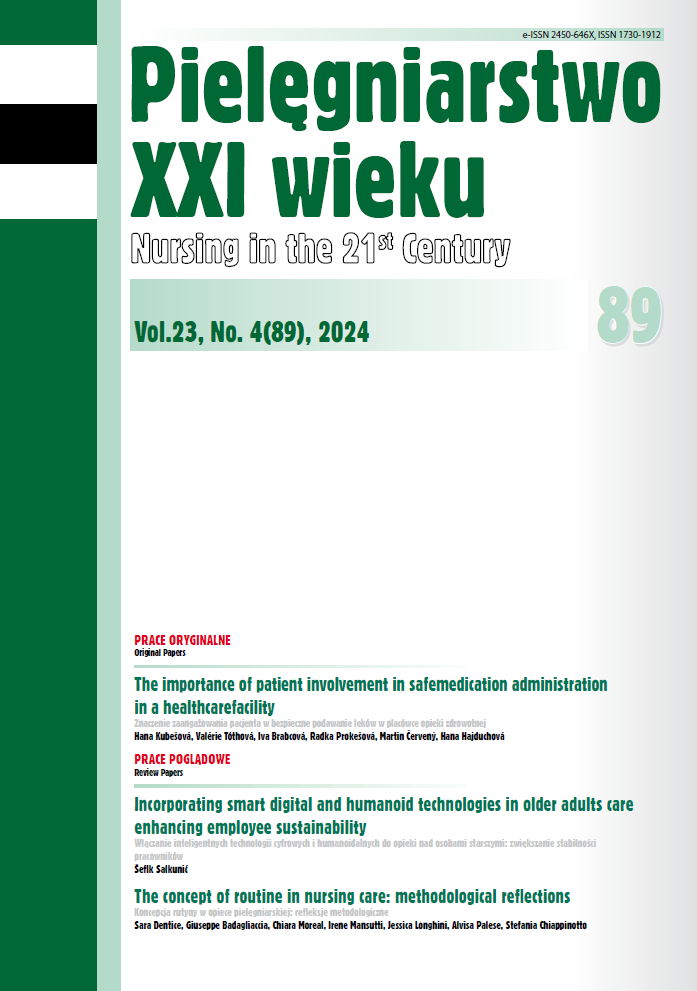The importance of patient involvement in safe medication administration in a healthcare facility
DOI:
https://doi.org/10.12923/pielxxiw-2024-0048Keywords:
patient, adverse event, medication error, Medication administrationAbstract
ABSTRACT THE IMPORTANCE OF PATIENT INVOLVEMENT IN SAFE MEDICATION ADMINISTRATION IN A HEALTHCARE FACILITY
Aim. This study aimed to evaluate patients’ subjective perceptions of medication administration in the hospital setting and assess their involvement in the process.
Material and methods. The research data were collected using a structured questionnaire. A total of 300 respondents from four hospitals in the South Bohemia region of the Czech Republic, who were hospitalized in the aftercare and rehabilitation department, surgical department, and internal medicine department, were included in the research.
Results. From the patient’s perspective, there was a signifi cant improvement in the nurses’ behavior during the medication administration process. Nurses pay more attention to patient identifi cation, wait for the patient to swallow the medication, do not put the medication on the patient’s table, and realize that their concentration during medication administration is critical to making the entire process safe.
Conclusions. Key aspects of patient engagement in the process include proper patient identifi cation, identifi cation of the correct medication, and proper administration method, including documenting the process in the patient’s record and reporting any adverse events. This comprehensive approach to patient involvement in medication administration contributes to safety and quality of care.
References
1. WHO – World Health Organization, 2019. WHO calls for urgent action to reduce patient harm in healthcare. [online] [cit. 2023-12-07]. Available via: https://www.who.int/news/item/13-09-2019-who-calls-for-urgent-action-to-reduce-patientharm-in-healthcare.
2. Heczková J. Role sester při zajišťování kvalitní a bezpečné farmakoterapie. Praktický lékař. 2021; 101, Supl. 1(2):12-16. ISSN: 0032-6739; 1805-4544.
3. Ciapponi A, et al. Reducing medication errors for adults in hospital settings. Cochrane Database Syst. Rev. 2021;11(11):CD009985. doi: 10.1002/14651858.CD009985.pub2.
4. Dhawan I, et al. Medication errors in anesthesia: unacceptable or unavoidable? Braz J Anesthesiol. 2017; 67(2): 184-192. doi: 10.1016/j.bjane.2015.09.006. Epub 2016 May 16.
5. Santos PRA, Rocha FLR, Sampaio CSJC. Actions for safety in the prescription, use and administration of medications in emergency care units. Rev. Gaúcha Enferm. 2019; 40. doi: https://doi.org/10.1590/1983-1447.2019.20180347.
6. Brabcová I, Prokešová R, Tóthová V, et al. Využití metody FMEA v řízení rizik ve zdravotnictví. Onkologie. 2021; 15(4): 197-203. ISSN: 1802-4475; 1803-5345.
7. Lawton R, O’Hara JK, Sheard L, et al. Can patient involvement improve patient safety? A cluster randomised control trial of the Patient Reporting and Action for a Safe Environment (PRASE) intervention. BMJ Qual. Saf. 2017; 26(8): 622-631. doi: 10.1136/bmjqs-2016-005570. Epub 2017 Feb 3.
8. O’Hara JK, Lawton RJ, Armitage G, et al. The patient reporting and action for a safe environment (PRASE) intervention: a feasibility study. BMC Health Serv. Res. 2016; 16(1): 676. doi: 10.1186/s12913-016-1919-z.
9. Veverková E, et al. Ošetřovatelské postupy pro zdravotnické záchranáře I. Praha: Grada Publishing; 2019, p. 228. ISBN 978-80-271-2418-3.
10. Sharma AE, et al. Patient Engagement In Health Care Safety: An Overview Of Mixed-Quality Evidence. Health Aff (Millwood). 2018; PMID: 30395509, DOI: 10.1377/hlthaff .2018.0716.
11. von Elm E, Altman DG, Egger M, et al. The Strengthening the Reporting of Observational Studies in Epidemiology (STROBE) statement: guidelines for reporting observational studies. Journal of Clinical Epidemiology. 2008; 61(4): 344-349. https://doi.org/10.1016/j.jclinepi.2007.11.008
12. Hajduchová H, et al. Safety of drug administration from the perspective of hospitalized patients in selected hospitals of the South Bohemia Region. Ceska Slov. Farm. 2022; PMID: 36443023.
13. Breuker C, Macioce V, Mura T, et al. Medication Errors at Hospital Admission and Discharge: Risk Factors and Impact of Medication Reconciliation Process to Improve Healthcare. Journal of Patient Safety. 2021; 17(7): e645-e652. https://doi.org/10.1097/PTS.0000000000000420
14. Salami I. Nursing students medication errors and adherence to medication bestpractice. Open Journal of Nursing. 2018; 08(05): 281-291. https://doi.org/10.4236/ojn.2018.85024
15. Nitro, et al. The safety of care focused on patient identity: an observational study. Acta Biomed. 2021; 92(S2): e2021038. doi: 10.23750/abm.v92iS2.11328.
16. Härkänen M, Tiainen M, Haatainen K. Wrong-patient incidents during medication administrations. J. Clin. Nurs. 2018; 27(3,4): 715-724.
17. Luokkamäki S, Härkänen M, Saano S, et al. Registered Nurses’ medication administration skills: a systematic review. Scandinavian Journal of Caring Sciences. 2021; 35(1): 37-54. https://doi.org/10.1111/scs.12835.
18. Asefa KK, Dagne D, Negash W. Medication administration error reporting and associated factors among nurses working in public hospitals, ethiopia: a crosssectional study. Nursing Research and Practice. 2021; 1: 1384168. https://doi.org/10.1155/2021/1384168
19. Bucknall T, Fossum M, Hutchinson AM, et al. Nurses’ decision-making, practices and perceptions of patient involvement in medication administration in an acute hospital setting. Journal of Advanced Nursing. 2019; 75(6): 1316-1327. https://doi.org/10.1111/jan.13963
20. McLeod M, Barber N, Franklin BD. Facilitators and Barriers to Safe Medication Administration to Hospital Inpatients: A Mixed Methods Study of Nurses’ Medication Administration Processes and Systems (the MAPS Study). PloS one. 2015; 10(6):e0128958. https://doi.org/10.1371/journal.pone.0128958.
Downloads
Published
Issue
Section
License
Copyright (c) 2025 Authors

This work is licensed under a Creative Commons Attribution 4.0 International License.




